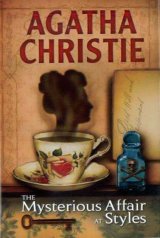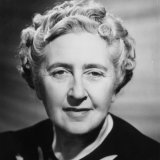The Mysterious Affair at Styles Page #10
The Mysterious Affair at Styles is a detective novel by British writer Agatha Christie. It was written in the middle of the First World War, in 1916, and first published by John Lane in the United States in October 1920 and in the United Kingdom by The Bodley Head on 21 January 1921.
“That may have been done some time ago,” I interrupted. “No, for it is still perceptibly damp and smells of coffee. Four, a fragment of some dark green fabric—only a thread or two, but recognizable.” “Ah!” I cried. “That was what you sealed up in the envelope.” “Yes. It may turn out to be a piece of one of Mrs. Inglethorp’s own dresses, and quite unimportant. We shall see. Five, this!” With a dramatic gesture, he pointed to a large splash of candle grease on the floor by the writing-table. “It must have been done since yesterday, otherwise a good housemaid would have at once removed it with blotting-paper and a hot iron. One of my best hats once—but that is not to the point.” “It was very likely done last night. We were very agitated. Or perhaps Mrs. Inglethorp herself dropped her candle.” “You brought only one candle into the room?” “Yes. Lawrence Cavendish was carrying it. But he was very upset. He seemed to see something over here”—I indicated the mantelpiece—“that absolutely paralysed him.” “That is interesting,” said Poirot quickly. “Yes, it is suggestive”—his eye sweeping the whole length of the wall—“but it was not his candle that made this great patch, for you perceive that this is white grease; whereas Monsieur Lawrence’s candle, which is still on the dressing-table, is pink. On the other hand, Mrs. Inglethorp had no candlestick in the room, only a reading-lamp.” “Then,” I said, “what do you deduce?” To which my friend only made a rather irritating reply, urging me to use my own natural faculties. “And the sixth point?” I asked. “I suppose it is the sample of cocoa.” “No,” said Poirot thoughtfully. “I might have included that in the six, but I did not. No, the sixth point I will keep to myself for the present.” He looked quickly round the room. “There is nothing more to be done here, I think, unless”—he stared earnestly and long at the dead ashes in the grate. “The fire burns—and it destroys. But by chance—there might be—let us see!” Deftly, on hands and knees, he began to sort the ashes from the grate into the fender, handling them with the greatest caution. Suddenly, he gave a faint exclamation. “The forceps, Hastings!” I quickly handed them to him, and with skill he extracted a small piece of half charred paper. “There, mon ami!” he cried. “What do you think of that?” I scrutinized the fragment. This is an exact reproduction of it:— 03 I was puzzled. It was unusually thick, quite unlike ordinary notepaper. Suddenly an idea struck me. “Poirot!” I cried. “This is a fragment of a will!” “Exactly.” I looked up at him sharply. “You are not surprised?” “No,” he said gravely, “I expected it.” I relinquished the piece of paper, and watched him put it away in his case, with the same methodical care that he bestowed on everything. My brain was in a whirl. What was this complication of a will? Who had destroyed it? The person who had left the candle grease on the floor? Obviously. But how had anyone gained admission? All the doors had been bolted on the inside. “Now, my friend,” said Poirot briskly, “we will go. I should like to ask a few questions of the parlourmaid—Dorcas, her name is, is it not?” We passed through Alfred Inglethorp’s room, and Poirot delayed long enough to make a brief but fairly comprehensive examination of it. We went out through that door, locking both it and that of Mrs. Inglethorp’s room as before. I took him down to the boudoir which he had expressed a wish to see, and went myself in search of Dorcas. When I returned with her, however, the boudoir was empty. “Poirot,” I cried, “where are you?” “I am here, my friend.” He had stepped outside the French window, and was standing, apparently lost in admiration, before the various shaped flower beds. “Admirable!” he murmured. “Admirable! What symmetry! Observe that crescent; and those diamonds—their neatness rejoices the eye. The spacing of the plants, also, is perfect. It has been recently done; is it not so?” “Yes, I believe they were at it yesterday afternoon. But come in—Dorcas is here.” “Eh bien, eh bien! Do not grudge me a moment’s satisfaction of the eye.” “Yes, but this affair is more important.” “And how do you know that these fine begonias are not of equal importance?” I shrugged my shoulders. There was really no arguing with him if he chose to take that line. “You do not agree? But such things have been. Well, we will come in and interview the brave Dorcas.” Dorcas was standing in the boudoir, her hands folded in front of her, and her grey hair rose in stiff waves under her white cap. She was the very model and picture of a good old-fashioned servant. In her attitude towards Poirot, she was inclined to be suspicious, but he soon broke down her defences. He drew forward a chair. “Pray be seated, mademoiselle.” “Thank you, sir.” “You have been with your mistress many years, is it not so?” “Ten years, sir.” “That is a long time, and very faithful service. You were much attached to her, were you not?” “She was a very good mistress to me, sir.” “Then you will not object to answering a few questions. I put them to you with Mr. Cavendish’s full approval.” “Oh, certainly, sir.” “Then I will begin by asking you about the events of yesterday afternoon. Your mistress had a quarrel?” “Yes, sir. But I don’t know that I ought——” Dorcas hesitated. Poirot looked at her keenly. “My good Dorcas, it is necessary that I should know every detail of that quarrel as fully as possible. Do not think that you are betraying your mistress’s secrets. Your mistress lies dead, and it is necessary that we should know all—if we are to avenge her. Nothing can bring her back to life, but we do hope, if there has been foul play, to bring the murderer to justice.” “Amen to that,” said Dorcas fiercely. “And, naming no names, there’s one in this house that none of us could ever abide! And an ill day it was when first he darkened the threshold.” Poirot waited for her indignation to subside, and then, resuming his business-like tone, he asked: “Now, as to this quarrel? What is the first you heard of it?” “Well, sir, I happened to be going along the hall outside yesterday——” “What time was that?” “I couldn’t say exactly, sir, but it wasn’t tea-time by a long way. Perhaps four o’clock—or it may have been a bit later. Well, sir, as I said, I happened to be passing along, when I heard voices very loud and angry in here. I didn’t exactly mean to listen, but—well, there it is. I stopped. The door was shut, but the mistress was speaking very sharp and clear, and I heard what she said quite plainly. ‘You have lied to me, and deceived me,’ she said. I didn’t hear what Mr. Inglethorp replied. He spoke a good bit lower than she did—but she answered: ‘How dare you? I have kept you and clothed you and fed you! You owe everything to me! And this is how you repay me! By bringing disgrace upon our name!’ Again I didn’t hear what he said, but she went on: ‘Nothing that you can say will make any difference. I see my duty clearly. My mind is made up. You need not think that any fear of publicity, or scandal between husband and wife will deter me.’ Then I thought I heard them coming out, so I went off quickly.”
Translation
Translate and read this book in other languages:
Select another language:
- - Select -
- 简体中文 (Chinese - Simplified)
- 繁體中文 (Chinese - Traditional)
- Español (Spanish)
- Esperanto (Esperanto)
- 日本語 (Japanese)
- Português (Portuguese)
- Deutsch (German)
- العربية (Arabic)
- Français (French)
- Русский (Russian)
- ಕನ್ನಡ (Kannada)
- 한국어 (Korean)
- עברית (Hebrew)
- Gaeilge (Irish)
- Українська (Ukrainian)
- اردو (Urdu)
- Magyar (Hungarian)
- मानक हिन्दी (Hindi)
- Indonesia (Indonesian)
- Italiano (Italian)
- தமிழ் (Tamil)
- Türkçe (Turkish)
- తెలుగు (Telugu)
- ภาษาไทย (Thai)
- Tiếng Việt (Vietnamese)
- Čeština (Czech)
- Polski (Polish)
- Bahasa Indonesia (Indonesian)
- Românește (Romanian)
- Nederlands (Dutch)
- Ελληνικά (Greek)
- Latinum (Latin)
- Svenska (Swedish)
- Dansk (Danish)
- Suomi (Finnish)
- فارسی (Persian)
- ייִדיש (Yiddish)
- հայերեն (Armenian)
- Norsk (Norwegian)
- English (English)
Citation
Use the citation below to add this book to your bibliography:
Style:MLAChicagoAPA
"The Mysterious Affair at Styles Books." Literature.com. STANDS4 LLC, 2025. Web. 31 Jan. 2025. <https://www.literature.com/book/the_mysterious_affair_at_styles_309>.








Discuss this The Mysterious Affair at Styles book with the community:
Report Comment
We're doing our best to make sure our content is useful, accurate and safe.
If by any chance you spot an inappropriate comment while navigating through our website please use this form to let us know, and we'll take care of it shortly.
Attachment
You need to be logged in to favorite.
Log In